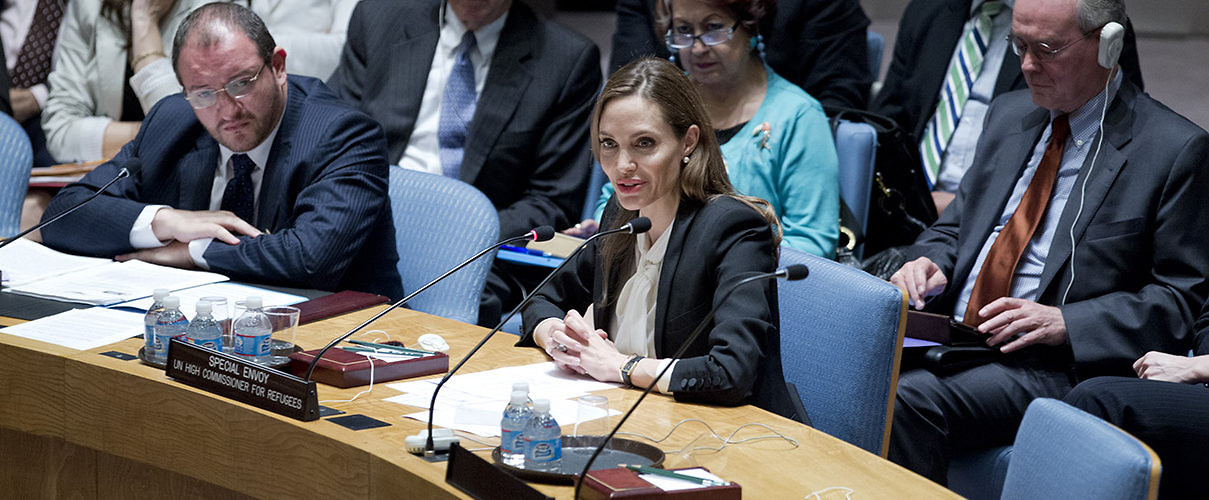Angelina Jolie-Pitt attends a UN Security Council meeting on women, peace and security. New York, June 24, 2013. (Rick Bajornas/UN Photo)
This week, the academic world was consumed by news that the London School of Economics (LSE) had appointed Angelina Jolie-Pitt as a professor of practice with its new Centre for Women, Peace and Security (WPS). The position, unpaid and honorary, will allow Jolie-Pitt to engage with students taking LSE’s new Master’s program on WPS. She will share her experience leading the United Kingdom’s Prevention of Sexual Violence Initiative (PSVI) and working for a decade-and-a-half with the United Nations Refugee Agency, first as goodwill ambassador and more recently as special envoy of the high commissioner.
Jolie-Pitt’s was one of four such appointments LSE made this week, the others being former UK Foreign Secretary William Hague, in recognition of his work with PSVI, Madeleine Rees, Secretary-General of the Women’s International League for Peace and Freedom, and Jane Connors, Amnesty International Director of Law and Policy. To some, including me, this combination of practitioner experience with high-powered academic inputs led by Professor Christine Chinkin—one of the world’s most highly regarded feminist scholars of international law—gives LSE’s research and graduate teaching program a cutting edge. It is likely to make a critical contribution to improving our understanding of WPS and furthering the normative goal of actually implementing this agenda.
Yet only one of these honorary appointments met with mocking ire by significant sections of the academic community. Jolie-Pitt, many contended, was unworthy of the professor of practice title. Some argued that her appointment drew resources away from underpaid teaching staff on short-term contracts, which is a facile argument given that the position is unpaid. If anything, her appointment will generate student interest and, with it, the income needed to hire more staff working under better terms and conditions. It is facile, too, in that the same argument was not used to criticize the other appointments.
Others argued that Jolie-Pitt was unqualified for the title of professor since she does not have a PhD. Yet neither do the other appointees or literally thousands of other honorary professors around the world. They have not drawn such ire. Others made the equally ignorant and somewhat condescending argument that Jolie-Pitt’s appointment was entirely about capturing her celebrity status and that her humanitarian work was vacuous at best. Curiously, this same argument was not leveled against Hague, whose qualification for appointment in this particular center was identical to Jolie-Pitt’s: a leadership role in the PSVI. For the record, it was Jolie-Pitt who persuaded Hague to take up the issue of preventing sexual violence in the first place. It is also a matter of public record that Jolie-Pitt’s contribution to both PSVI and UNHCR goes well beyond that of celebrity endorsement.
Some tried to draw analogies with the medical sciences. A school of medicine would not award a professorship to someone who simply “hangs around sick children,” it was alleged. But the comparison breaks down quickly. A school of medicine would not appoint someone who has not practiced medicine, yet international affairs departments do it all the time. Most professors of international affairs have never actually practiced international affairs, so, by this standard, how are they qualified to teach it?
Jolie-Pitt’s appointment does two things, and does them well. First, it gives LSE’s students and researchers working on WPS access to a leading activist who has played a central role in building a major international initiative in the form of PSVI, and in making the argument for better humanitarian protection for more than a decade. Second, it raises the profile of a new degree program on WPS. This will hopefully encourage more students to take the course. This is a good thing in and of itself. Since I began in the field of international affairs, I have read about the marginalization of gender in the field. Surely, getting more students to study WPS will help address that.
There are a number of bigger issues here. Was Jolie-Pitt’s appointment singled out for such vitriolic criticism because she is a woman? Otherwise, why criticize her appointment and not Hague’s, when their credentials are similar? Was it because she is famous, with academic snobbery to blame? Or was it because she is considered insufficiently intelligent? Whatever the answer, it does not reflect well on the academy.
A broader issue is the relationship between the study and practice of international affairs and what constitutes “knowledge.” The best insights on contemporary international peace and security are generated at the intersection of theory/history and practice. In this field, at least, one without the other paints an incomplete and sometimes inaccurate picture. Practitioners sometimes lack the big picture and make implausible causal connections.
Academics often miss the nuance of policy, the breadth of its substance, and the politics of its formation. It is through the collection of different types of knowledge and experience that understanding is generated and improved. By bringing together top academics with practitioners that have a range of different experiences to bring to the table, LSE’s new women, peace, and security center has created exciting potential to elevate the place of gender within the field of international peace and security. For that reason, I say “three cheers for LSE and Professor of Practice Jolie-Pitt!”





